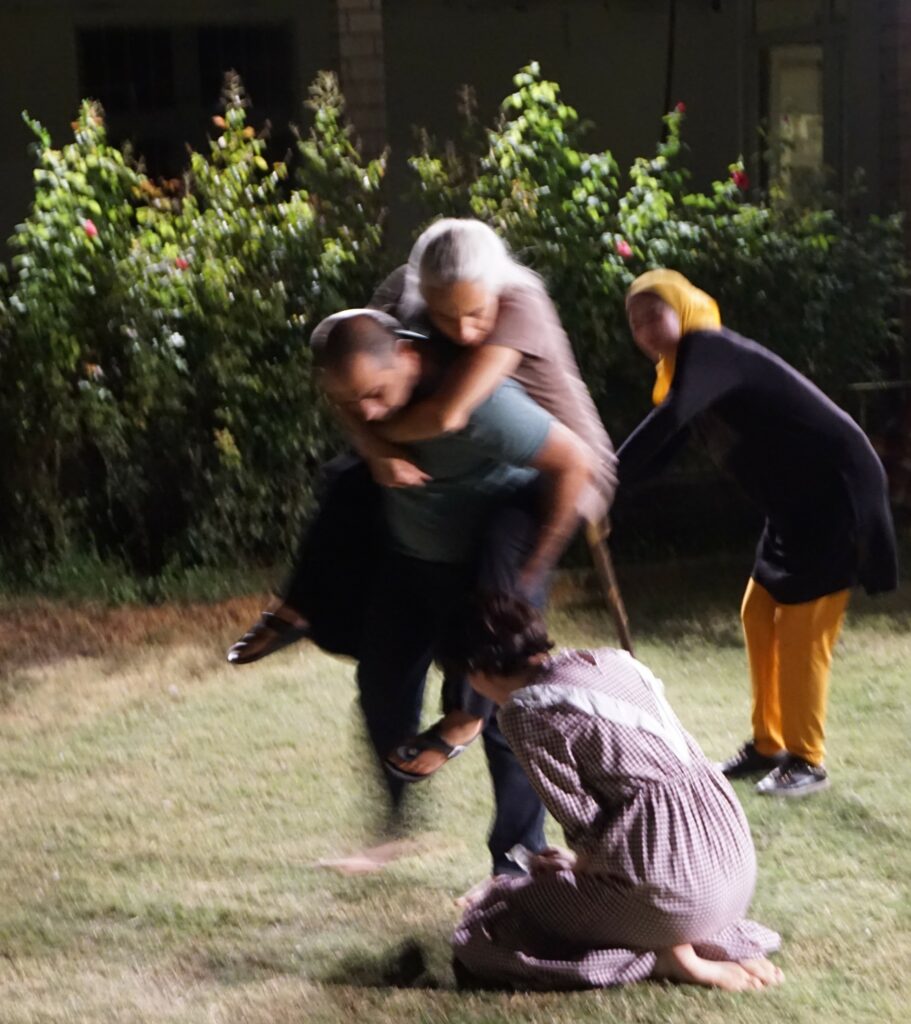This year the group´s work is tricky: After the demanding, well paced performance of „Letter to the General” (see article “Dear General” below), the stakes are high and our material seems rather modest: After doing productions largely focused on literary texts in the past years, this time we´ll be working mostly without words. Handke’s HOUR WE KNEW NOTHING OF EACH OTHER, his silent piece about a square populated by hundreds of characters, seems to be a step backward for the ensemble. Only few of them draw the line to the political momentum with upheavals happening in public squares all around Arabian countries, especially in Iraq.
Most of the actors however have a hard time even reading this play, made of stage directions only. First exercises on different styles of walking them seem interesting to them but stay abstract. Only when we take them to the local market square and ask them to watch these hundreds of people, their bodies, children and partners – only then does the play really seem to get down to earth – and it gets “local“ when I ask them to note what´s missing when a German writer is sits down on an Italian square. How do Arab squares differ from this European role model? Is it the man who´s eating dried fruit with his little son? Is it the sellers pushing their carts with tired bodies and watchful eyes, the women who carry their little children like shopping bags – or is it the underage bag sellers, that are circling around us getting more desperate by the minute: Such a big group lingering on the square for such a long time – and not a single one of them is buying a plastic bag!

Although with this project we won´t be able to stop child labor in Kurdistan – that´s something Siraj, one of our most committed players, tries to do: He´s a social worker in STEP´s day center that offers the market´s child laborers a safe space to relax and be children again – we learned a lot: every pushy water seller tells a story worth to be told by Peter Handke. When the actors come back, they are better motivated, and they starts developing what Brecht once called “social accuracy”: physical states are examined for their social reality and only then sharpened and exaggerated, the exercises by choreographer Paolo are understood as first steps towards a more radical physical approach that we achieve to develop this year.
Another one of our aims is to develop the team spirit of the ensemble, whose members are from highly diverse backgrounds: actors with biographies disrupted by war and displacement from Aleppo or Qamishli, the Kurdish part of Syria, meet Kurdish residents such as Serwar, who just finished Slemani Academy of Dramatic Arts, and Rikawt, who runs a successful barbershop with his brother, and Danyar, who keeps throwing his massive body ruthlessly into the rehearsals´ work every night – and who during the breaks tries to convince everyone that Metallica is the best band ever.
It is a gift for all of the team how the actors´ generosity gives life to even the slightest little scenes of Peter Handke: Ishraq from Palestine has spent years in Kurdistan waiting for her visa. She keeps surprising us with courageous and personal improvisations, proving again how silly any distinction between “professional” and “amateur” always is. It´s like as if theater is returning to its source: You have something to say, you enter the stage, you say it.When I ask her to play someone who is dying, she starts crawling on the floor, peels out of her blanket at the end of the room, gasps for air and dies, all this in a swift and undramatic way. What is it she showed us? We can hardly believe what she´s telling us: Her Palestinian brother is trapped in an Israeli prison, sentenced for decades. A few weeks ago, six fellow prisoners from Ishraq’s hometown dug a tunnel and escaped their Israeli enemies. Four of them were caught again. This is what she was trying to perform: A person that finally finds freedom and has to give up in the very moment.
Stefan Otteni